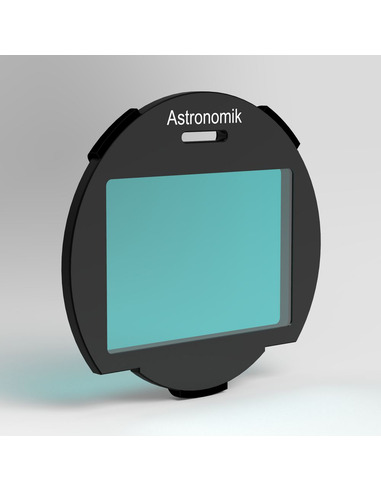Clip-Filters for mirrorless Canon Full-Format Cameras EOS R and RP
These Clip-Filters can be installed with your fingers only. Mounting and removing the Clip-Filter is quick and easy. It can be done at any time. No modifiations to the body are necessary to use the Clip-Filters.*
Clip-Filters for mirrorless Canon Full-Format Cameras EOS R and RP
These Clip-Filters can be installed with your fingers only. Mounting and removing the Clip-Filter is quick and easy. It can be done at any time. No modifiations to the body are necessary to use the Clip-Filters.*
Compatible Canon EOS Bodies
| Model | Compatibel? |
| EOS R | Yes |
| EOS R5 | Yes |
| EOS R6 | Yes |
| EOS RP | Yes |
| EOS Ra | Yes |
Note: These Clip filters are NOT compatible with this lens: Canon RF 35mm f/1.8 IS MACRO
If you are new to astrophotography and looking for your first filter: We do recommend getting the Astronomik CLS!
The CLS gives you maximum contrast due to it effective surpression of artifical light pollution, but still gives you neutral and well balanced colors. With the Astronomik CLS you can do very deep images of amazing quality even form a urben/suburban observing site!
For the advanced Astrophotographer we do offer a wide selection of filters: Perfect accessories for all kinds of astrophotography. To compile a usefull selection of filters for your obeserving goals we would be happy to give you advise, either via phone or eMail.
The full range of Astronomik filters is available as Clip-Filters for EOS R and EOS RP bodies now.
* You might want to modify your camera to get a maximum sensetivity at H-alpha and SII for Astrophotography. But this has nothing to do with the Clip-Filters! You may use the Clip-Filters without any modifications to the body. (But some filters like H-alpha and SII-CCD might not make sense with an unmodified camera.)
Please note that Canons Astro-Version "Ra" of the R-body shows strong halos around brighter stars! (Even without any filter) We highly recommend NOT to get a Ra!
Mounting the Astronomik EOS R Clip-Filter:
Mounting the Astronomik EOS R Clip Filter is very easy: You don't need any tools and filters may be changed even at night without any problems.
Remove the lens and take the Clip Filter from it? box. Slide the Clip-Filter into the body and press it in with two fingers, until it rests flush. Re-install the lens. -Your camera is ready for imaging!
Removing the Astronomik EOS R Clip-Filter:
Removing the Astronomik EOS R Clip-Filter is very simple too: Pull the filter out with the supplied tool, get the filter with two fingers and put it into it´s storage box. -Done within seconds and the camera is working as before.
The Astronomik CLS CCD is suitable under light-polluted skies for DSLR Cameras, which have been remodeled for astronomical use. The filter enhances the contrast between all deep-sky objects and the background.
The CLS-CCD Filter enhances the contrast between astronomical objects and the background. Due to the wider transmission curve compared to UHC filters, a greater amount of light will pass the filter. Stars will be less dimmed. This filter has been optimized to block as much spurious light as possible and simultaneously provide the best performance for 'useful' light. A good filter for DSLR-, CCD- and film b/w-photography as well as observation of deep-sky-objects with telescopes or photo lenses of all aperture f/2 and above.
Main use
The filter blocks completely emission lines of artificial light sources like streetlights (e.g. sodium- and mercury-vapor) as well as the airglow. All 'important' emission lines as well as the spectral range of the night-adapted eye are beeing passed. The supplementary IR-blocking layer allows the use for DSLR- and Webcams without an integrated IR-block filter.
Other uses
- Easier resolution of Double Stars.
- With the EOS-Clip model, photography with DSLR cameras is feasible even unter extreme light-polluting conditions without shifting the white balance.
- The 1.25" and 2" socket models can be used for observations from light-polluted areas.
- If you plan to create color images from emission line data, our CLS-CCD filter is a great choice for the Luminance channel
Alternatives
CLS: For cameras with an integrated IR-filter or for visual observation.
Suitability
- Visual observation (dark skies): Good, to reduce light pollution by mercury-vapour lamps (streetlight)
- Visual observation (urban skies): Reasonable, an UHC-E or UHC filter is more suitable
- Film photography: Very good, colour balance is near perfect
- CCD photography: Very good, optimized rejection of light pollution
- DSLR photography (original): Good, colour balance shifted but contrast enhanced
- DSLR photography (astro modified): Very good, colour balance is near perfect
- DSLR photography (MC modified): Very good, colour balance is near perfect
- Webcam / Video (Planets): Unsuitable
- Webcam / Video (Deep Sky): Very good, if light pollution is a big problem
Technical Data
- 95% transmission at 486nm (H-beta)
- 95% transmission at 496nm (OIII)
- 95% transmission at 501nm (OIII)
- 97% transmission at 656nm (H-alpha)
- pass from 450 to 520nm and from 640 to 690nm
- Parfocal with other Astronomik filters
- Glass thickness: 1mm
- Completely resistant against high humidity, scratches and aging effects
- Diffraction limited, the filter will not reduce the optical performance of your telescope!
- Astronomik filters are delivered in a high-quality, long lasting, filter box
- Since 2008 we do ship filters with a completely new design. Any kind of halo or strange reflection is a matter of past
- Applicazione filtro
- Fotografico
- Tipo di filtro
- Broadband*~Inquinamento luminoso*~CLS
- Filter size
- Clip filters




